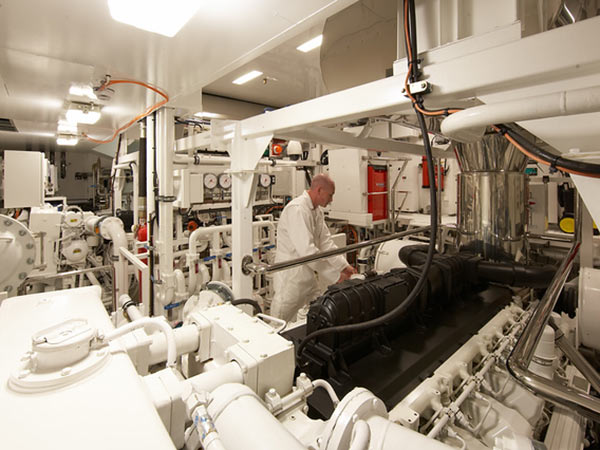Engineer / Assistant Engineer job description

The main function of the Engineer is to maintain the mechanical and electrical operations of the yacht. This position will entail very large, complicated jobs, and it can, at the same time, incorporate something as small as fixing a remote control for guests, or fixing a toilet.
An Engineer must be a very technically-minded individual who can wear many hats during the course of the day. He/she must be able to transition well between engine room work and interacting with guests. The Engineer will ultimately be responsible for keeping the mechanical side of the yacht, particularly Hotel Services, running without a hitch.
An Engineer is responsible for just about everything on the yacht that could break and need to be fixed. This includes everything from the main engines to smaller pieces of equipment like jet skis, televisions, refrigerators, air conditioners, etc. This individual must be able to trouble-shoot and repair virtually everything in the confines of the yacht. Additionally, a good engineer will have a good knowledge base of finding and purchasing parts for the yacht. As most yachts travel around the world, it is important to maintain and inventory all parts and be prepared for breakages, replacements, etc.
The Engineer is directly responsible to the Chief Engineer and may look after the electrics and electronics if there isn\’t an electrician or ETO (Electronic Technical Officer) on board.
Assistant Engineers are sometimes employed on larger yachts as an entry-level position. It is the Assistant Engineer’s job to assist all other members of the Engineering department with their work. As your gain experience you may be responsible for specific tasks yourself. It is a great way of learning all about engineering on board a superyacht in a hands-on way, and can be a good stepping-stone to an Engineer position.
Required Skills and Experience
An Engineer may have experience of working on board superyachts, either as an Assistant Engineer or as a Deckhand. Alternatively they may have experience of working in other marine engineering or engineering sectors. Any skills or experience relevant to the systems on board (eg marine engines (inboard and outboard), generators, air conditioning, water makers, electric and electronic systems, etc) will be advantageous.
An Assistant Engineer is an entry-level position, and while no previous experience is required, candidates should be technically-minded, hard working and keen to learn and progress.
Required Certification
An Engineer should hold the MCA STCW Basic Safety certification, or Merchant Navy or Royal Navy Engine Room Watch Keeping Certificate or equivalent.
Salary Range
An Engineer would usually earn a salary of between £2,000 and £3,500 per month, depending on the size of yacht and the scope of the position. With around 5 or more years experience, this could rise to between £2,800 and over £4,000 per month.
An Assistant Engineer could expect to earn around £1,500 per month.
Career Progression
Engineer
Superyacht Crew
The natural progression for an experienced Engineer is to a Chief Engineer role. However, in some cases an Engineer develops a specialism in Electrics or Electronics and may decide to become an Electronic Technical Officer (ETO) or an Electrician.
Marine Industry
An experienced Engineer would be in demand in a number of roles within the marine industry. Boatbuilding and shipbuilding firms employ Engineers and Engineering Supervisors and Managers to lead their Engineering Teams. Port Operators also require Engineers.
Other Industries
Engineering skills are valued in many other industries. Depending on the position, it may however be necessary to attend training courses or gain qualifications to convert your marine engineering skills to those relevant to the position.
Assistant Engineer
Superyacht Crew
An Assistant Engineer will usually progress to become an Engineer.
Marine Industry
Assistant Engineer on board a superyacht is usually a junior, entry-level position which will give you a good background in knowing how a superyacht engineering department runs. There are a whole host of Engineering roles available in the wider maritime sector, for example in the leisure sector as a Marine Engineer, or as an Engineer in a Port Operation. You may also wish to consider the Merchant Navy’s Engineering Officer Training programme. Without relevant qualifications you are likely to need to start at the bottom, but your experience will certainly be advantageous in getting your chosen job.
Other Industries
There are a whole host of Engineering roles available in many other industries. Without relevant qualifications you are likely to need to start at the bottom, but your experience will certainly be advantageous in getting your chosen job.
